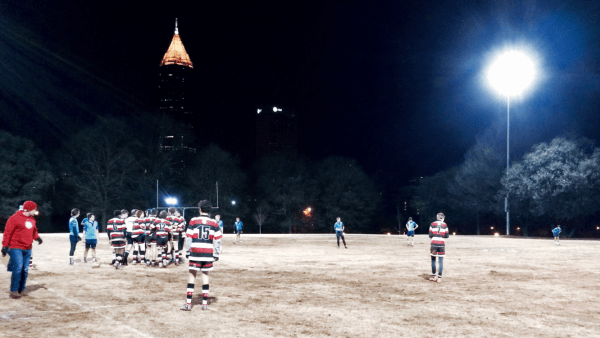Tackling Life With AYR
More stories from Harry Suazo

AYR vs St. Cloud at Central Park Field
Imagine walking out onto a field on a late October evening, cradling an egg-shaped ball under your arm and staring down a team of huge guys or girls who you’re going to have to tackle head on in a minute or two. As the whistle blows, you begin to play the second most violent sport in the world. These are the pre-game thoughts of the Grady students who play rugby with Atlanta Youth Rugby (AYR). Rugby is a rough contact sport that originated in Warwickshire, England and became the precursor to American football. In 2012, Stewart Haddock founded AYR, but the organization didn’t have a concrete team until around 2014.
Rugby is an extremely emotional game and takes hard work, endurance and perseverance to play. “At first rugby was terrifying,” said sophomore Harrison Gray, who has played with AYR since 2014. “It’s hard to get over the initial fear you feel when you stare down someone bigger than you before you tackle them, but once you get over that fear and start playing the game, it elicits a unique feeling of adrenaline that you can’t get anywhere else.”
Although playing rugby can seem like a daunting task, it reaps enormous benefits.
“Playing rugby builds me up on both mental and physical levels, and the people you meet at matches are generally gentleman,” sophomore Ethan Damiani said.
Gray, who played on the JV team last year, said his experience not only helped him build as a player, but also let him build close bonds with his teammates. In rugby, the only way to get results is to play as a team. By the end of the season, teammates have become more like brothe
rs. “The harshness of rugby has really helped me to bite the bullet and do things I wouldn’t usually be brave enough to do,” Gray said. “It’s also helped me learn more about my responsibility as a member of a team, especially when it comes to helping other people out. If I see one of my teammates going down, I know I need to be there ready to ruck.” Rucking is move in rugby where two teams bend over facing down and lock arms while pushing against each other to gain possession of the ball. “When you’re out on the field, about to throw your body at someone bigger than you, it’s not so hard to commit if you know that one of your best buds is by your side ready to help you out,” Gray said.
Last year the team was coached by Dylan Fawsitt, a rugby player for Life University, who taught them how to play the savage sport like gentlemen. He grew up in Ireland and was nicknamed “The Butcher” when he wrestled in college. The team can testify that the name suited him. Fawsitt played a big role in helping these boys mature through rugby. “Butcher taught me what it means to work as a team and to not let your own inhibitions prevent others from reaching their goal,” Gray said. Although a lot of the skills Butcher taught were physical moves, he also showed the team how to preserve their minds while playing such a vigorous sport. “Sometimes, before a game, you have to dismiss every thought in your brain that tells you that it’s a bad idea,” Gray said. “You turn off every survival instinct you have and you say to yourself, ‘If I do this right, I won’t hurt myself.’” Gray was referring to the fact that in rugby, players must learn how to tackle each other without colliding head on.
Gray said that Butcher always had an adage to boost the team’s confidence, like “Everything you ever accomplish is going to take an ounce of sweat and a pint of blood.” This is a useful thing to remember, at rugby, school, and throughout life. Rugby is a good platform to learn about yourself and about being a team, because if you can throw all you’ve got at someone charging you, you can throw all you’ve got at life too.
